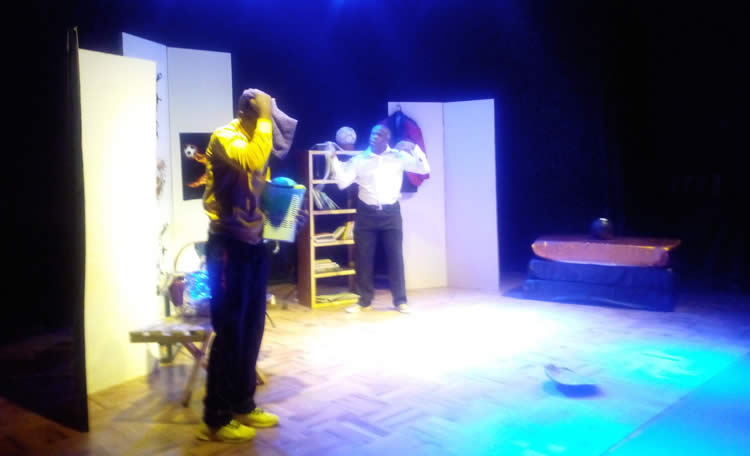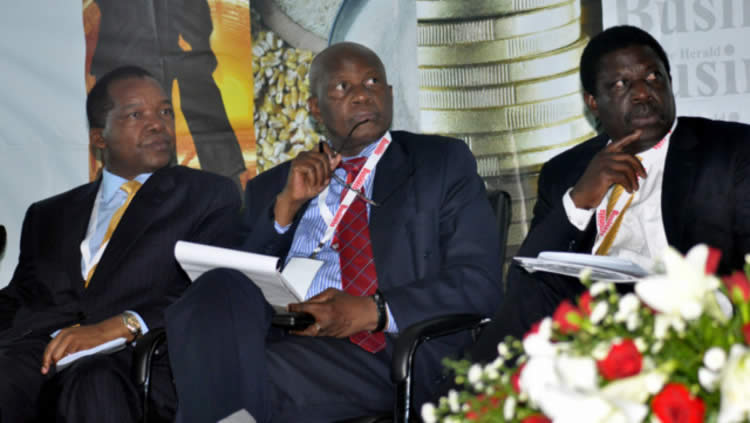Play explores juju in soccer

Jonathan Mbiriyamveka Entertainment Reporter—
Rooftop Promotions’ new play called “Juju Soccer” sets out to show some of the factors bedevilling Zimbabwean football, but away from the field of play there are other forces which threaten the development of the world’s most beautiful game. The play, which ran at Alliance Francaise’s Old Mutual Theatre from November 19 to 22, boasts a seasoned cast comprising Daves Guzha, Mandla Moyo and Teddy Mangawa.
Guzha, who has a habit of making rare theatrical appearances once in every three years, has been plying his trade for the last 29 years as actor, director and producer.
Multi-award winner Moyo, whose theatrical exploits have seen him perform on almost every continent, has worked with some of the best directors in the world.
These two relatively old and tried horses were joined by one young actor who is a gem and award winner, Mangawa, whose star continues to soar.
The casting was deliberate as it brings a diverse team reflective of the status quo in the theatre sector.
Written by Zimbabwe’s foremost playwright,Stephen Chifunyise, produced and directed by Guzha, the play mirrors more than just football politics but the state of affairs in Zimbabwe.
Critics were quick to liken the three-hander to party politics whereby there are two factions.
While this may sound like a joke, the underlying factor is that there are three groups of people whereby one group wants to maintain the status quo, while the other wants to do things professionally and the other believes in spiritual intervention.
In “Juju Soccer”, Chifunyise brings to the fore the touchy and contentious subject of the perceived use of juju and superstition which has been an emotive subject in the beautiful game of football the world over.
The play tackles this belief passed on from football generation to generation although people do not want to talk about it openly.
Reasons why teams at different stadiums refuse to use dressing rooms with some not even using the designated entry points into the ground are tackled.
Of late it has become common knowledge for groundsmen during maintenance to remove animal bones, hair, feathers and suspicious objects after a match.
Godobori Musanawenzou played by Guzha is a loud-spoken traditional healer who is overconfident, strict, instructive, expensive, overbearing and very boastful of his achievement.
Extratime Chigumbo, played by Mangawa is a highly qualified coach but with little experience in local soccer coaching having been an assistant coach in Germany and Sweden of a low division football club.
He is thoughtful, thorough, respectful and principled professional, with strong self- belief and confidence in his coaching methods. He is a keep fit fanatic who is constantly exercising. He is a family man who is constantly in touch with his children and wife.
Godknows Zidumburemombe ably played by Moyo is the chairman and founder of Kambuzuma United Football Club of Harare.
A prominent businessman, former football player. He is pompous, superstitious and a very ambitious man.
Zidumburemombe and Extratime cross swords after he hires Godobori to use his juju ahead of the Premiership game.
Like all traditional healers, Godobori brings his charms including zvikwambo (goblins) but Extratime refuses to co-operate.
The play reveals the dark side of the world’s most beautiful game all in the name of winning games.
The play kicks off Rooftop Promotions’ theatre schedule after having spent close to two years focusing on the re-establishment of its flagship theatre venue Theatre in the Park.
The production is set to show at various stages throughout the world as well as key festivals in London, Sweden, Norway, Denmark, Portugal, South Africa, Kenya, Mozambique, Zambia, Spain to mention just a few. The play had a successful run with assistance from the Culture Fund of Zimbabwe Trust and Danish Embassy development wing Danida.











Comments